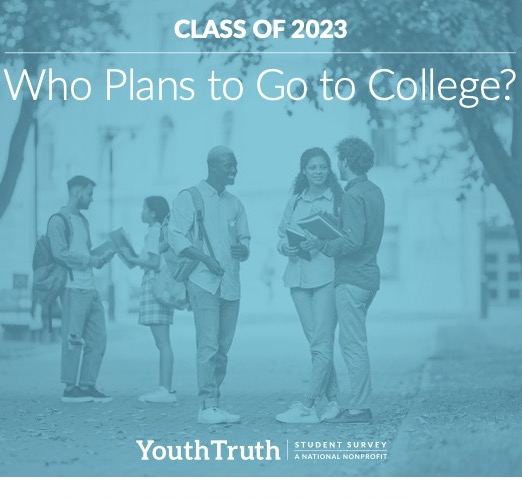 A new survey by YouthTruth looks at the college plans of the high school class of 2023. The authors note that “polls show that Americans are losing faith in the value of a college education, and many, including high school students, are debating whether college is ‘worth it.’ College enrollments are in decline, and undergraduate degree attainment numbers fell last year for the first time in a decade. The percentage of high school graduates enrolling in college immediately after high school has dropped, and there is widespread alarm that community colleges in particular are in trouble.”
A new survey by YouthTruth looks at the college plans of the high school class of 2023. The authors note that “polls show that Americans are losing faith in the value of a college education, and many, including high school students, are debating whether college is ‘worth it.’ College enrollments are in decline, and undergraduate degree attainment numbers fell last year for the first time in a decade. The percentage of high school graduates enrolling in college immediately after high school has dropped, and there is widespread alarm that community colleges in particular are in trouble.”
So researchers set out to measure the college-going plans of this year’s high school graduates to determine if the trends they observed will hold into the future. The report found that nearly three out of four seniors (74 percent) in the class of 2023 aspire to go to college. However, only 66 percent of this year’s graduates expect to go to college.
There are only slight differences in the patterns of college aspirations and expectations of Black and White seniors in the class of 2023. Some 74 percent of White high school seniors say they want to go to college and 67 percent believe they will actually enroll. For Blacks, 74 percent said they wanted to go to college, but only 66 percent thought they would actually enroll.
In 2019, 79 percent of Black high school graduates said they wanted to go to college. This year, the figure has dropped to 74 percent.
Some 51 percent of White high school graduates this year said they expect to enroll in a four-year college. For Blacks 49 percent of high school graduates said they expect to enroll in a four-year college. Another 16 percent of White high school graduates said they plan to attend community college. For Black high school graduates the figure was 17 percent.
The authors conclude that “this report shows, for all too many of America’s youth, the road to college remains obscured, blocked, or just plain closed. And, since 2019, successfully navigating the road to college has become even more challenging for many. From college counselors and admissions officers to policymakers and philanthropic funders the time is past due for all adults concerned with equity of educational opportunity to tune into the perceptions of students themselves and enlist young people as partners in constructing more clearly marked paths that are open to all who aspire to college.”











